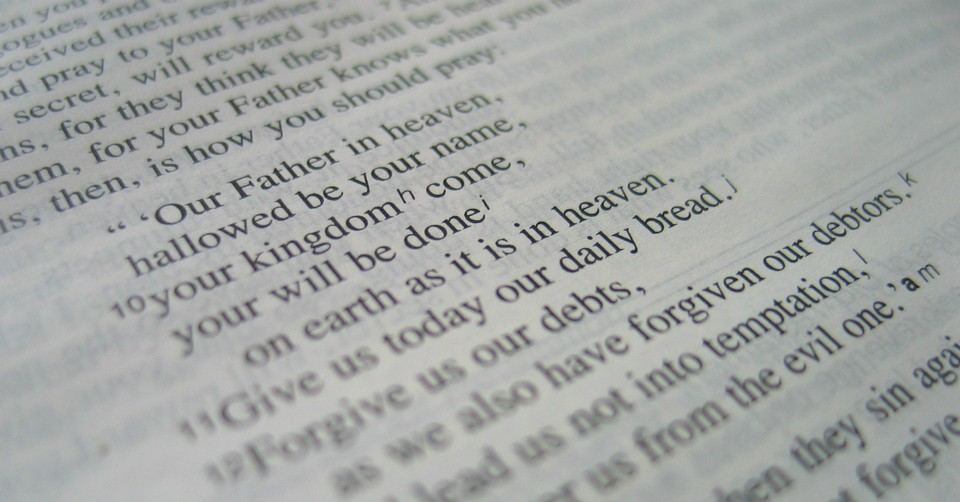9 Phrases Unique to the Lord’s Prayer

Did you know Jesus Christ couldn’t pray the Lord’s Prayer for Himself? Verse 12 certainly doesn’t apply! Then again, when Jesus taught what’s often called the Disciples’ Prayer, everything applied to His followers right then – and all down through the ages.
Back then, Jesus used certain words and phrases that were fairly new or brand-new to many of His followers. That certainly helped them to memorize and recite the Disciples’ Prayer. In many ways, that still is true for us in English.
In this article, we’ll start with the KJV text of Matthew 6:9-13. Then we’ll look at parallel words and phrases in the contemporary NIV, NLT, and NET translations. We’ll do this verse by verse. What we’ll discover are 9 unique words and phrases. May they help you more richly enjoy the Disciples’ Prayer!
Matthew 6:9 – Our Father in Heaven
KJV: Our Father which art in heaven, Hallowed be thy name.
NIV: Our Father in heaven, hallowed be your name,
NLT: Our Father in heaven, may your name be kept holy.
NET: Our Father in heaven, may your name be honored,
“Our Father in heaven” doesn’t appear anywhere in the Old Testament (Hebrew Scriptures) and appears only in the Disciples’ Prayer within the New Testament (Christian Scriptures).
In the Old Testament, the shorter phrase “Our Father” referring to the Lord God does appear in Isaiah 63:16 and Isaiah 64:8. What’s more, the Lord calls Himself “Father” in Malachi 1:6.
In the New Testament, we find references to “Our Father” here and the parallel Disciples’ Prayer, in Luke 11:2. The rest of the Gospels and Acts don’t use the phrase. Once we get to the Epistles, however, it appears in Romans 1:7, 1 Corinthians 1:3, 2 Corinthians 1:2, and the opening greetings in a majority of Paul’s other epistles.
“Hallowed” is used only here, this once, in many English Bible translations, not just in the KJV and NIV. The original Greek term is used first here and then 27 more times later in the New Testament. In those other uses, the term is translated “holy,” “honored,” and related terms, and not just in the NLT and NET.
Matthew 6:10 – Your Kingdom Come
KJV: Thy kingdom come, Thy will be done in earth, as it is in heaven.
NIV: your kingdom come, your will be done, on earth as it is in heaven.
NLT: May your Kingdom come soon. May your will be done on earth, as it is in heaven.
NET: may your kingdom come, may your will be done on earth as it is in heaven.
This is the only verse where one of our four translations adds a word. It’s the word “soon” in the NLT translation. While “soon” doesn’t appear in the original Greek, the NLT translators decided it might help some English readers. The word “soon” appears 283 more times after this in the NLT New Testament, so the term is far from unique!
What is unique? “Your kingdom” referring to the Lord God’s kingdom appears once in Psalm 45:6 (quoted in Hebrews 1:8) and three more times in Psalm 145:11-13. None of those four references talks about or suggests the possibility of the Lord’s kingdom coming to earth. In that sense Jesus is the first one to say, “your kingdom come.” The shorter phrase, “your kingdom” is repeated by James and John’s mother in Matthew 20:21 and by the dying repentant thief in Luke 23:42.
Matthew 6:11 – Our Daily Bread
KJV: Give us this day our daily bread.
NIV: Give us today our daily bread.
NLT: Give us today the food we need,
NET: Give us today our daily bread,
The original Greek word for “daily” is used only here and Luke 11:2-4, Luke’s version of the Disciples’ Prayer. The original word is focused on the 24 hours coming up and thus could be translated “for the next day.”
The broader phrase “our daily bread” is used by Jesus alone here in the Disciples’ Prayer. (Conversely, the phrase “my daily bread” is used by Job in Job 23:12 and by Agur in Proverbs 30:8.)
Matthew 6:12 – Forgive Us Our Debts
KJV: And forgive us our debts, as we forgive our debtors.
NIV: And forgive us our debts, as we also have forgiven our debtors.
NLT: and forgive us our sins, as we have forgiven those who sin against us.
NET: and forgive us our debts, as we ourselves have forgiven our debtors.
The phrase “forgive us” and the longer phrase “forgive us our debts/sins” are used by Jesus alone here in the Disciples’ Prayer. The only exception is John’s use in 1 John 1:9, which says, “If we confess our sins, he is faithful and just and will forgive us our sins and purify us from all unrighteousness.” This appears to be a deliberate quote from the Disciples’ Prayer, which some or many of John’s readers may have learned after their conversion.
The phrase “as we have forgiven” is used by Jesus alone here in the Disciples’ Prayer. This and similar phrases in other translations appear only once in the whole Bible. What Jesus says to pray is profoundly new to His followers. In essence, He says to pray: “Our Father, only forgive us if and as we have forgiven others.” That’s cause for a deep pause!
The Greek word for “our debts” is used only here and, in a different form, in Romans 4:4. Luke’s version of the Disciples’ Prayer says “sins.” Many translators and other scholars see “debts” as a metaphor for “sins” since the meaning isn’t financial, but rather is moral and ethical.
Matthew 6:13 - Temptation
KJV: And lead us not into temptation, but deliver us from evil:
NIV: And lead us not into temptation, but deliver us from the evil one.
NLT: And don’t let us yield to temptation, but rescue us from the evil one.
NET: And do not lead us into temptation, but deliver us from the evil one.
The Greek word for “temptation” is used here first and appears 20 more times in the rest of the New Testament. Similarly, the Greek word for “deliver” is used here first and appears 16 more times in the rest of the Christian Scriptures.
The Greek word for “evil” is understood by many translators and other scholars as a reference to “the evil one,” that is, Satan, the Devil. We see this elsewhere, including John 17:15.
The KJV adds a sentence to verse 13 that’s not in the oldest Greek manuscripts. The sentence, however, echoes some of the beautiful language in David’s psalm of praise to the Lord found both in 1 Chronicles 16:8-36 and Psalm 105:1-15. Therefore, the sentence is fully Holy Spirit-inspired. The sentence reads: “For thine is the kingdom, and the power, and the glory, for ever. Amen.” I pray this sentence every day, and hope you will consider doing the same.
In this article, we’ve looked at 9 unique words and phrases used by Jesus Christ in the Disciples’ Prayer. May they help you memorize, recite, remember, and more richly enjoy the world’s most famous prayer!
Photo Credit: ©GettyImages/Matthew Maude

Originally published November 23, 2021.





